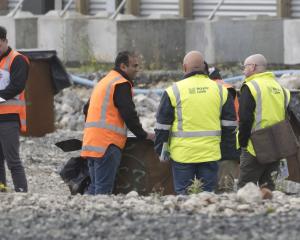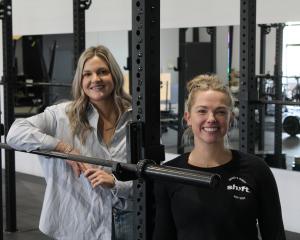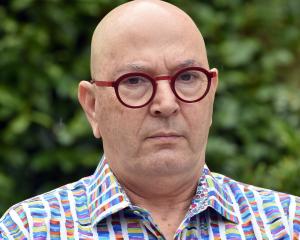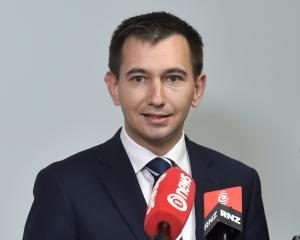
The two hubs provide a combined South Island neurosurgery service, but have "no real interaction", Prof Dirk De Ridder told the Otago Daily Times.
"From a theoretical point of view, it sounds good, but in reality, there is no collaboration."
From this month, Prof De Ridder is focused mainly on his University of Otago research, but will perform surgical procedures that fall in his area of interest.
The Southern District Health Board is recruiting two neurosurgeons.
Another academic neurosurgeon, Reuben Johnson, left early this year for a position in Wellington.
Clinical leader, neurosurgeon Ahmad Taha, remains at Dunedin Hospital.
An expert panel in 2010 recommended Dunedin Hospital have three neurosurgeons, two of them with academic duties.
This was considered a sustainable way to provide the service and ensure they had enough to do.
The service was also reconfigured with hubs in Christchurch and Dunedin.
Belgian neurosurgeon Prof De Ridder arrived in 2013 as the first appointee to the Neurological Foundation Chair in Neurosurgery at Otago University.
His recruitment was celebrated by those who had fought for Dunedin neurosurgery.
Prof De Ridder put it like this: "The philosophy from Christchurch is, ‘We’re five neurosurgeons, we don’t need Dunedin, so why would we send anything to Dunedin at all’?
"Their point of view is that there should only be one unit, which should be in Christchurch, and all neurosurgeons in the South Island should work there."
Prof De Ridder wanted the hubs to split surgeries into types, and refer patients to the hub that did that type.
He was keen to involve Wellington too.
Prof De Ridder believes it is necessary to gain the critical mass, because neurosurgery has small patient volumes.
He said he was not blaming individual Canterbury neurosurgeons.
There were different perspectives on how to provide the service, and Prof De Ridder believes national-level leadership is required.
"It depends too much now on individuals, rather than some central organisation that says ‘Whether you want it or not, you will have to collaborate in order to deliver a better service to patients’.
"The way it is running now is definitely not, I think, the best solution, because there is not enough [cases] in Otago and Southland to keep up the numbers high enough to maintain sufficient experience, and that’s a fundamental problem.
"I will stay here and maintain the academic position, but I will dramatically reduce my clinical activities through what I do best, which is acoustic neuroma surgery and skull-based surgery."
When the ODT spoke to Prof De Ridder he was in Wellington to perform acoustic neuroma surgery.
The Wellington service was easier to collaborate with than Christchurch, he said.
The SDHB has indicated other services might be put under a joint Christchurch-Dunedin model.
Cardiothoracic surgery is a potential candidate, although the SDHB has not identified specific services.
Prof De Ridder’s research, including using brain implants to treat alcohol addiction, has attracted wide interest.
"I’m still very happy to be here."
Prof De Ridder said he initially expected to be clinical leader of Dunedin neurosurgery, but Mr Taha was appointed to the top clinical role.
"[The SDHB] never wanted me to be the clinical leader, which I found very strange coming from a country where it was automatically like that [for the academic professor]."
Dunedin Hospital surgeon and intensive care specialist Mike Hunter played a central role in the 2010 neurosurgery campaign.
Asked for comment, Mr Hunter said the situation was not surprising.
"I don’t think that the guys in Christchurch ... have ever truly committed to this. They accepted reluctantly, because they had to."
Joint-site services only work well if people made a big effort to overcome the challenges posed by distance.
"They have to be friendly, and I hate to say it, but [Christchurch clinicians] haven’t been very friendly," Mr Hunter said.
Canterbury District Health Board chief executive David Meates said CDHB wants the two-site service to work.
And it is working, "in a way", he said, but it needed ongoing attention.
"I know it’s frustrating at times, people wanting black and white answers, but generally speaking, we’ve agreed there’s going to be a South Island neurosurgery service that has got two hubs."
Mr Meates said the situation highlighted the need to employ generalist neurosurgeons, rather than surgeons who focus on a particular part of neurosurgery.
Interim SDHB chief executive Chris Fleming said the DHB was "committed" to the two-site model for neurosurgery.
"Neurosurgery has its own history, and although there have been challenges, this doesn’t mean that this model will not work for other services in the future."
Former SDHB chief executive Carole Heatly, who left in August, had been chairwoman of the South Island neurosurgery governance group.
"We believe our leadership structures are sound. Neurosurgery services are governed by the South Island neurosurgery governance group, and while ongoing chairing arrangements are yet to be determined, those involved are committed to making the arrangement work well," Mr Fleming said in a statement.
The South Island Neurosurgical Service Expert Panel was appointed in 2010 by the Ministry of Health to settle a row between Canterbury DHB and Southern DHB.
Canterbury had been trying to centralise the entire service in Christchurch, but its plan was blocked in large part by a high-profile public campaign backed by the Otago Daily Times.
The panel listened to the public, and decreed the two-site service.
It received 2256 submissions from 2193 members of the public, along with 21,332 ODT coupons supporting the retention of the service in Dunedin.
In August that year, up to 10,000 people attended a protest march in Dunedin to support the service.
The panel’s report outlined the new model and said public pressure played a role in the outcome.
Health providers "ignore the community view at their peril", the panel’s report said.
The panel said developing academic neurosurgery in Dunedin was the key to providing a clinical service in the South.
At a glance
• Prof Dirk De Ridder scales down clinical work at Dunedin Hospital.
• First appointee to Neurological Foundation Chair in Neurosurgery at Otago University, and will retain that role.
• Main focus neurosurgery research, such as addiction implant trials.
• Christchurch unwilling to work closely with Dunedin to manage clinical casework.
• Joint clinical-academic roles recommended by an expert panel to support Dunedin Hospital neurosurgery.
• SDHB trying to recruit two neurosurgeons.
Advertisement
Comments
It's relevant to mention that patients of Mr Taha are happy that he is clinical leader, Neuro, and unhappy at any prospect of referral to CDHB for procedure.
This will all work out beautifully for the government and their fly in commission. The obvious intent is to move specialist services to Christchurch and "lack of cooperation" between the hospital boards will just make the case stronger for CDHB to take control of various functions.
The weekend reports of the development funnel for New Zealand also strongly pointed out central government intent Christchurch be the focal point for the South Island. Investment in health facilities there is many times that offered for Dunedin. There is a clear intent to reduce services in Dunedin to justify that expenditure.
I feel I have to respond to this exceedingly one sided article, once again maligning Neurosurgery in Christchurch. It is well known that we are in favour of a single Neurosurgical Unit for the South Island to service the one million people residing. This is without doubt the best solution for the region providing top quality care within the resources available and maintaining surgical standards whilst also training new neurosurgeons. The fact two neurosurgeons have recently resigned in Dunedin (as have most neurosurgeons before them) shows that the critical mass of Neurosurgery is too low in Southland to keep them busy and maintain their interest. Dirk De Ridder and Mike Hunter are misleading you in saying we are not cooperative and "unfriendly". We have a good working relationship between the units discussing most cerebrovascular and paediatric neurosurgery/oncology cases and developing suitable management plans. The tumour cases that De Ridder is doing is often done in combination with Christchurch surgeons that travel to Dunedin to help him. We regularly send patients to Dunedin for Radiosurgery. This one-sided propaganda is not helpful.
R Boet, Neurosurgeon, Christchurch













